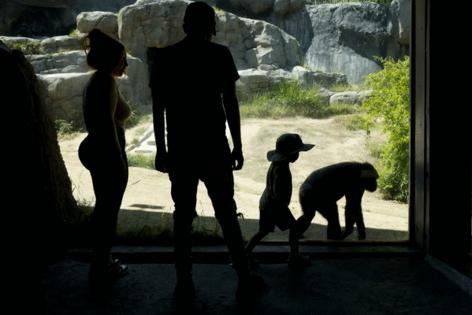Commentary: The sanctuary movement for monkeys
Published in Op Eds
In 2000, Congress passed the Chimpanzee Health Improvement, Maintenance, and Protection Act (C.H.I.M.P. Act) to provide funding for lifetime care and sanctuary for chimpanzees who had been kept and used in U.S. laboratories. Today, chimpanzee sanctuaries across the United States care for more than 700 of these majestic great apes.
That there is widespread public and political support for this cause makes sense: Chimpanzees are at least 95% genetically similar to humans.
But a similar plan has yet to be devised for the monkeys in U.S. laboratories, and that needs to change.
According to the U.S. Department of Agriculture, there were more than 105,000 non-human primates (mostly monkeys) living in laboratories or holding facilities nationwide in fiscal 2023, the majority being rhesus macaques, which are at least 93% genetically similar to humans and chimpanzees. Other species of monkeys, including the long-tailed macaque, marmosets and tamarins, are also being used in research.
This similarity demands that funding be set aside for them too.
I am a former primate researcher who in 2004 formed the nonprofit organization Primates, Inc., to create a Wisconsin-based primate sanctuary. It opened in 2017 and today houses a dozen monkeys, mostly rhesus macaques, with long-term plans to expand to house up to 100 monkeys. I have seen firsthand how the need to provide sanctuary for these magnificent animals vastly exceeds availability. There are currently only a small handful of primate sanctuaries across the country. Funding and space constraints have been a challenge for years.
Who is responsible for addressing this problem? All of us. Donations from the general public and from laboratories who choose to send their monkeys to sanctuary are vitally important, but funding from our federal government will have the most impact. Currently, there is no federal funding available to expand existing sanctuaries or to construct new sanctuaries for monkeys, like there is for chimpanzees under the C.H.I.M.P. Act.
It is only fair that a small percentage of the funding available for conducting experiments on monkeys be set aside to allow researchers to send monkeys to sanctuary. Yet most of the companies and institutions involved in research have resisted the idea that they have a lasting responsibility to the monkeys they buy, breed and use.
I’m heartened that alternatives to animal models, such as non-animal methods, are continually being refined and slowly adopted, as they have the potential to replace the use of monkeys in most research. And in recent months, government agencies including the National Institutes of Health, the Food and Drug Administration and the U.S. Navy have all announced their intent to phase out the use of animals in research.
As welcome as these developments are, I worry that the large numbers of monkeys no longer needed in research laboratories will be sold or euthanized instead of being sent to a sanctuary.
The Captive Primate Safety Act, which was introduced to Congress this year, would put a stop to the breeding and selling of monkeys as pets—a practice which should never be allowed. Many a monkey owner has learned the hard way that cute baby monkeys grow up into unpredictable, dangerous wild animals. Many abandoned pets wind up at sanctuaries, leaving less room to help monkeys from laboratories.
The larger problem is that the monkeys used in research deserve funding to achieve sanctuary, just as chimpanzees do, and separate legislation should be developed for that purpose. If there is still federal and private funding available to provide testing on the monkeys, a portion of that funding should be set aside to help them get to a sanctuary.
As more funding is set aside for the monkeys and the number of sanctuaries grows, more monkeys can be helped.
It is the least we can do, to address this problem of our own making.
_____
Amy Kerwin is a former primate research specialist and founder of Primates Incorporated. This column was produced for Progressive Perspectives, a project of The Progressive magazine, and distributed by Tribune News Service.
_____
©2025 Tribune Content Agency, LLC.

























































Comments